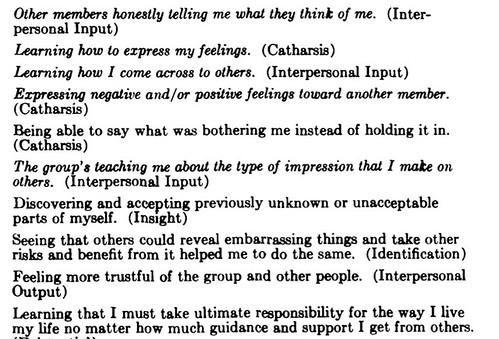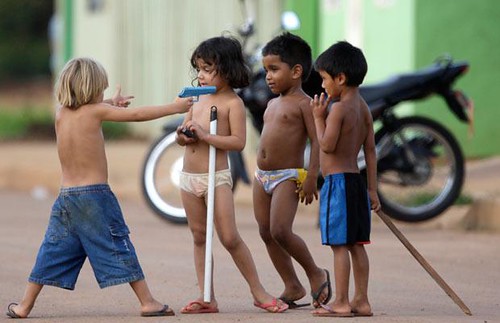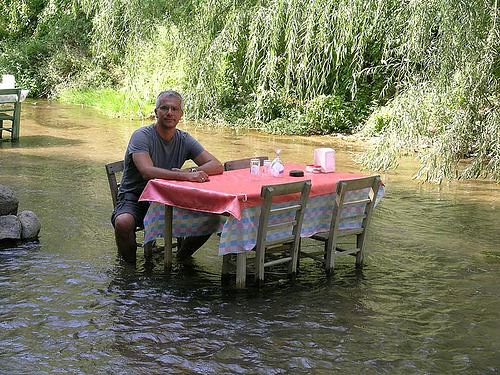Irving Yalom was the messiah of group therapy. He wrote many classic articles and books on the topic. At one point in his research he isolated the ten most important psychological functions of group therapy which provides an interesting list indeed. Any group therapist can easily facilitate most of these which are listed below.
Of course some of these can be done in individual therapy as well. For example number 2, 5, 7 & 10. Indeed individual therapy can provide therapeutic advantages that group therapy can not or will be less effective in doing. Individual therapy allows for more focus in the transference and is better for attachment building between the client and the therapist. In a group therapy setting the client’s transference reactions tend to be more diffuse or spread amongst the therapist and other clients in the group. This generally speaking makes the transference reactions less intense. If the therapist is wishing for the client to develop a strong transference reaction to the therapist then individual therapy is obviously better for that.
If the therapist is wishing to reduce the intensity of the transference from the client then group therapy is the better way to go. Sometimes the issue presented can be the determining factor for individual or group therapy. Most group therapy sets up a family situation in the client’s mind. The therapist(s) become the parent figures and transference is said to develop and the other group members become the siblings where one has the sibling transference reactions.
Of course this is not always the case and at times group members can have quite strong transference reactions between each other when one member reminds another member of some aspect of their mother or father. This often happens when one group member is quite parental in their attitudes and presentation. But generally speaking the group members will see each other as sibling type figures and let me reassure you that can stir up very strong emotions at times.
I have dealt with clients who have expressed very strong feelings of jealousy, anger, love, competitiveness and so forth in reaction to another group member. This of course can be a determining factor in the choice of group therapy. If a client presents a ‘sibling’ issue as the problem then group therapy is an excellent way of addressing that. There may be problems with their actual biological siblings or they may present a problem with friends or perhaps co workers where there is jealousy, competitiveness, feeling less worthwhile than others and so forth.
If the client comes from a family where the parents did favor one child over another or did play the children off against each other or they did get the older sibling to parent the younger siblings then these types of problems are also suited for the group therapy approach. They will inevitably surface and then played out in the group setting and therefore can dealt with by the therapist.
I have run many different types of groups over the years and have always done individual therapy as well. For the vast majority of clients some combination of both does seem to produce the best results. However there are some clients who simply refuse to do group therapy for a variety of reasons and thus only individual therapy can be used. I have clients who refuse to do therapy with even one other person in the room most often the spouse. They are not comfortable with it for some reason so it does not happen.
Different personality types also have different needs for group or individual therapy. The clients who can have difficulty forming an attachment of course would benefit from individual therapy and these can include the avoidant, schizoid, antisocial and the narcissist personality types. Other personality types can as well but it is these ones in particular.
Group therapy with these can also be of assistance but for different reasons
1. The narcissist can benefit from group therapy if the therapist can use the other members to work through their primary narcissism problems. Children learn they are not the only one who is important because the parents treat their siblings with the same importance as they have. The therapist can do the same with other group members and the narcissist can learn about the value of others. The primary narcissism gets resolved.
2. The schizoid has an indifference to relationships and seeks out solitary activities so as you can see group therapy would have its uses with this kind of person. The indifference can result from just feeling different and perhaps a fear of others and relationships. There is another type that is sometimes known as the superiority complex. The schizoid views others as less than. He may see them as being governed by their primitive animal urges or having mundane and banal lives that they just live out and then die.
The key is for the therapist to illustrate to the client what they are missing out on which can be hard to do. If they feel reasonably comfortable with their own company why should they want to be any different. The other feature of the schizoid is they have retarded emotions. They present as having and experiencing few emotions which means the Free Child is significantly restricted and it is this that can allow for the changes to occur. If the therapist can facilitate the experiencing of emotions the Free Child gets energized and then the desire for relationship can be re energized, then the group therapy becomes useful.
Firstly group therapy provides an opportunity to meet like minded others. Of course one is not wanting their therapy groups become like an introduction agency but I have seen many long and special relationship develop between people who first met in group therapy. Second the schizoid will be quite defended against meeting and being in relationship which can be brought out into the open and worked through and this is where some of Yalom's points comes into play
Learning how I come across to others
Other members honestly telling me what they think of me
The group’s teaching me about the type of impression I make on others
Feeling more trustful of the group and other people
The therapist can facilitate and manage an exchange between the schizoid and another group member on matters such as these in order to get through the schizoid’s defenses against relationship.
3. The avoidant is in someways easier to deal with than the schizoid. Whilst both usually have few social relationship, the avoidant wants to have them whereas the schizoid does not. The avoidant personality has the motivation there to start with which makes group therapy quite useful at some point. They usually have strong fears of being criticized, looking foolish, not being liked and so forth. This is why they avoid relationships. As with the schizoid the therapist can orchestrate an exchange between the avoidant and other group members such that these fears can be brought out into the open and dealt with such that there is a positive outcome.
4. The antisocial is similar to the narcissist in many of the ways they relate to others. Others have little meaning for them and hence they can be used and abused. Others in the group can feedback their reactions to the antisocial about such things. Whilst this is a good start and a positive use of group therapy, this person will often have a strong and well defended system of justification such as:
“No one ever cared for me so why should I care for others”.
“I was used and abused as a child so that’s the way life is”.
(And often they were never cared for and they were abused as children)
The therapist somehow needs to break through this defence system which can be hard to do.
Trust in relationship is particularly important for the antisocial. As children they learnt to never trust others and usually with good reason. In some way getting the antisocial to a point where he can trust another group member would be a useful thing to do. Again the antisocial may be highly defended against doing such a thing.
Graffiti







0 comments:
Post a Comment